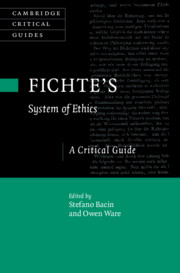Book contents
- Fichte’s System of Ethics
- Cambridge Critical Guides
- Fichte’s System of Ethics
- Copyright page
- Contents
- Contributors
- Acknowledgments
- Abbreviations and Translations
- Introduction
- Chapter 1 Fichte’s Ethics as Kantian Ethics
- Chapter 2 Fichte on Normativity in the Late Jena Period (1796–1799)
- Chapter 3 Fichte on Autonomy
- Chapter 4 Feeling, Drive, and the Lower Capacity of Desire
- Chapter 5 Fichte and the Path from “Formal” to “Material” Freedom
- Chapter 6 Fichte on the Content of Conscience
- Chapter 7 Fichte’s Theory of Moral Evil
- Chapter 8 Embodiment and Freedom
- Chapter 9 Ethics as Theory of Society
- Chapter 10 My Duties and the Morality of Others
- Bibliography
- Index
- Cambridge Critical Guides
Chapter 3 - Fichte on Autonomy
Published online by Cambridge University Press: 20 May 2021
- Fichte’s System of Ethics
- Cambridge Critical Guides
- Fichte’s System of Ethics
- Copyright page
- Contents
- Contributors
- Acknowledgments
- Abbreviations and Translations
- Introduction
- Chapter 1 Fichte’s Ethics as Kantian Ethics
- Chapter 2 Fichte on Normativity in the Late Jena Period (1796–1799)
- Chapter 3 Fichte on Autonomy
- Chapter 4 Feeling, Drive, and the Lower Capacity of Desire
- Chapter 5 Fichte and the Path from “Formal” to “Material” Freedom
- Chapter 6 Fichte on the Content of Conscience
- Chapter 7 Fichte’s Theory of Moral Evil
- Chapter 8 Embodiment and Freedom
- Chapter 9 Ethics as Theory of Society
- Chapter 10 My Duties and the Morality of Others
- Bibliography
- Index
- Cambridge Critical Guides
Summary
The chapter examines the “Deduction of the Principle of Morality” in §§1–3 of the System of Ethics with reference to Kant’s definition of autonomy, and shows that Fichte objects to this theory of autonomy on two fronts. First, Fichte argues that Kant fails to present a “genetic” account that reveals the inner structure of the legislating subject. From Fichte’s point of view, this line of reasoning merely explains that we have to take ourselves as lawgiving, but not how we can understand ourselves to be bound by a law we are giving. Second, Kant argues that the imperative can be applied to sensible incentives, but according to Fichte he fails to articulate a mediating a priori form which shapes sensibility itself. The chapter suggests that Fichte’s conception of striving towards the “entire I” is meant to respond to these perceived shortcomings in Kant’s ethics.
- Type
- Chapter
- Information
- Fichte's System of EthicsA Critical Guide, pp. 47 - 65Publisher: Cambridge University PressPrint publication year: 2021
- 1
- Cited by

